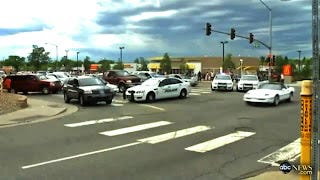Can police detain numerous drivers & passengers and search them without probable cause?

Aurora, CO - On the afternoon of June 2, the authorities say, a former music teacher named Christian Paetsch walked into a Wells Fargo bank waving a gun and ordered everyone to lie down.
About 15 minutes later, a phalanx of police cars descended upon an intersection a few miles away, blockading dozens of shocked motorists — including Mr. Paetsch, whom the authorities had tracked with a GPS device buried in the $26,000 he was accused of stealing.
But with only the faintest physical description and unsure which vehicle the device was in, the police trained their weapons on all 20 cars at the intersection and ordered people to show their hands. For nearly two hours, the police ordered every driver and passenger to step out of their cars, even handcuffing some of them, before discovering the missing money and two loaded firearms in Mr. Paetsch’s S.U.V.
The case, now winding its way through the federal court system, is being watched by Fourth Amendment lawyers and law enforcement experts. While advanced technology now gives the police the power to shadow a suspect moments after a crime is committed, there are still legal questions over how wide a net the authorities can cast while in pursuit.
At issue is not Mr. Paetsch’s involvement in the robbery. Rather, his lawyer, Matthew Belcher, a federal public defender, has argued that evidence seized from Mr. Paetsch’s vehicle should be thrown out on the grounds that the roadblock was unconstitutional.
The Fourth Amendment, Mr. Belcher said, should keep the police from rounding up large groups of people at gunpoint based merely on a hunch.
“Basically, the law is there to prevent the cops from doing exactly what they did,” Mr. Belcher said, “from stopping 20 to 30 people without any specific facts leading them to say that one person did it.”
Federal prosecutors declined to comment. But in court filings, they argued that the roadblock was the safest option, given the potential for a high-speed chase through Aurora.
Last month, Judge William J. Martinez of Federal District Court in Denver agreed, ruling that the evidence was admissible and that the detention of the other motorists was justified, given that a potentially dangerous criminal was on the loose. The judge also said, however, that he was troubled by the invasive tactics used by the police toward motorists caught in the blockade.
Mr. Belcher said he planned to appeal the decision. Beyond the fate of his client, who faces seven years to life in prison, there are other unresolved issues.
According to the defense, among the indignities endured by citizens ensnared in the roadblock, a 4-year-old girl urinated on herself while strapped in her car seat. And a mother was ordered to crawl through a passenger-side door and was then handcuffed in front of her son.
http://www.nytimes.com/2012/11/20/us/case-pits-police-use-of-technology-against-citizens-rights.html?_r=1&adxnnl=1&ref=us&adxnnlx=1353423934-N9aCJ14djir5/rdjSc71RA&


